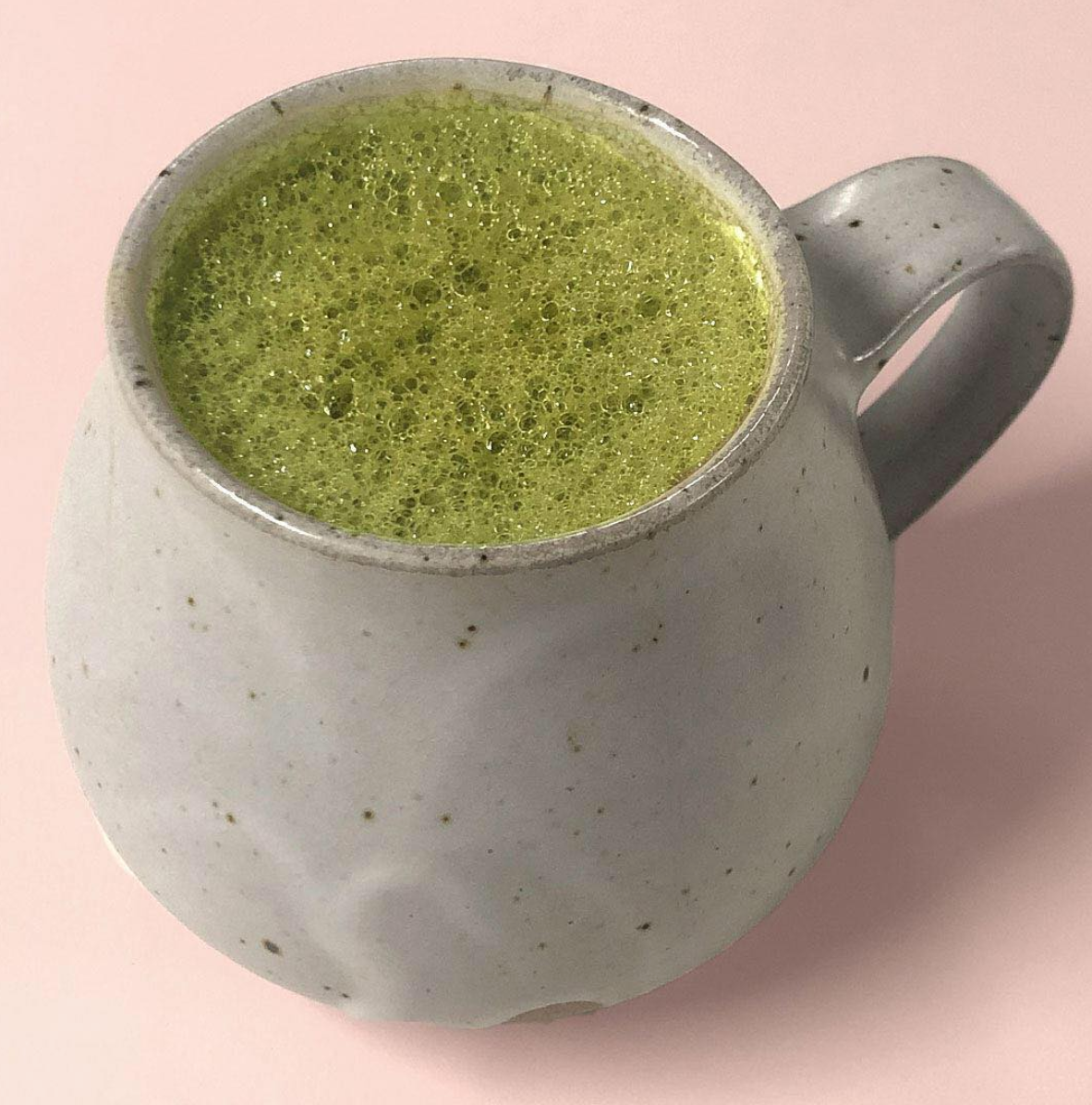Jena's Famous Matcha Recipe (And Why You Should Drink Matcha Every Day!)

Did you know that Green Tea was originally brought to Japan by a Buddhist Monk named Eisai who referred to it as “precious medicine”. While green tea leaves are left in the sun to dry to be used later steeped as a hot tea, Matcha bushes are kept under cover to increase their chlorophyll and amino acid levels. They are then stone ground into powder which has a richer, more buttery profile and is often enjoyed in both hot and cold beverages as well as desserts. While they both share the same benefits, matcha has 137 times the amount antioxidants, 130 times more calcium and 172 times the amount of protein than regular green tea leaves.
Some of the beneficial chemical compounds found in Matcha include:
Polyphenols: highest source found in Green Tea leaves, these plant compounds/micronutrients protect from oxidation, free radical damage, tissue degradation and disease. Positive impact on gene expression as well as inflammation reduction.
Catechin: the tannin that provides flavonoid and antioxidant benefits. Known to reduce formation of free radicals and prevent cell and DNA damage.
EGCG: especially high in epigallocatechin-3-gallate (EGCG), a type of catechin that has been shown to have powerful anti-cancer properties. Other test-tube studies have shown that EGCG is effective against skin, lung and liver cancer. It also reduces inflammation, aids in weight loss and prevents cell damage.
L-Theanine: an amino acid that crosses the blood brain barrier with the ability to increase GABA, a brain activity and nervous system regulator.
Some of the health benefits of integrating good quality matcha daily may be:
- Energy: L-Theanine works synergistically with natural caffeine in green tea to stabilize energy. It also contains theophylline which provide a more sustained release of energy and though it contains less caffeine than coffee, it provides 4-6 hours of sustainable energy.
- Focus: L-Theanine boosts projection of alpha waves in brain.
- Weight loss: EGCG increases the hormone that makes you feel full faster and boosts metabolism. Also helps burn 25% more calories.
- Calming: L-Theanine boosts the brains GABA levels to help with anxiety, depression, stress and sleep disorders.
- Detox: Chlorophyl found in Matcha naturally eliminates chemicals and heavy metals from the body.
- Skincare: EGCG reduces redness while polyphenols restore elasticity and protect against UV damage.
- Heart: Polyphenols help lower LDL levels and at the same time increase HDL levels. Also lowers risk of stroke by 21% according to David Geffen School of Med, LA.
- Brain: EGCG and L-Theanine work synergistically to restore memory and improve brain function.
- Disease: Catechins and EGCG work synergistically to generate apoptosis in cancer cells, especially breast, prostate and colorectal. Also lowers risk of Diabetes according to Zhijeing University, China.
- Antimicrobial: Catechin has strong antibacterial and antiviral effects and helps prevent and treat colds, flus, coughs, sore throat and nasal congestion.
- Oral: Catechins antibacterial properties prevent oral germs and reduction of acids in the mouth that destroy tooth enamel and cause cavities.
Matcha comes in 4 grades which integrates flavor and profile. These grades do not interfere with health benefits: (make sure you are buying organic matcha):
Ceremony Grade: creamy, delicate and sweet.
Cafe Grade: full bodied, astringent and grassy.
Classic Grade: creamy and bitter.
Kitchen Grade: most astringent.
The best Matcha is sourced from Japan and is steamed, not roasted or pan-fried because it retains all the nutrient-rich value possible from the tea leaf and does not have a bitter taste.
Although Japan’s Fukushima Radiation crisis has many people weary of Japanese Matcha, it is still the best tea source when it comes to other origins. The regions in Japan it is largely cultivated include Uji/Kyoto, Shizuoka, Nishio and Sayama. However Kagoshima, Miyazaki, Kumamoto and Yame are known to be safe radiation free regions. Because this tea is considered sacred in Japanese culture, safety levels are continually checked and recorded. Japanese soil is also said to carry a higher nutritional value than other countries.
Matcha can be enjoyed in many different beverage and dessert applications, however dairy milk should be avoided. German researchers discovered that the protein in dairy milk (casein) binds to catechin, neutralizing it which inhibits absorption of the health benefits. Always opt for water or non dairy milk instead. Make sure to store loose matcha powder in the fridge in an opaque container so that heat and light cannot enter in order to preserve the antioxidants. One cup of matcha has the equivalent antioxidant as ten brewed cups of green tea, so it’s safe to say this packs a powerful punch. Matcha is also high in amino acids, trace minerals, B-complex and vitamin A, C, E and K just to name a few.
And because we love you so matcha, we are sharing Jena Covello’s famous Iced Matcha Recipe to enjoy all the many beautiful benefits of this very delicious and healing tea.
Jena’s Famous Matcha
2 tablespoons matcha (my favorite matcha is from Aime Skincare)
1 large ice cube
1 cup hemp milk
2 tablespoons 100% organic maple syrup
5 shakes of organic cinnamon
3 shakes of pink himalayan salt
3 tablespoons of coconut manna
Blend and Enjoy!
If you want to enjoy hot, add all ingredients to a pan until warm, then blend together.
By Jena and Natasha M





